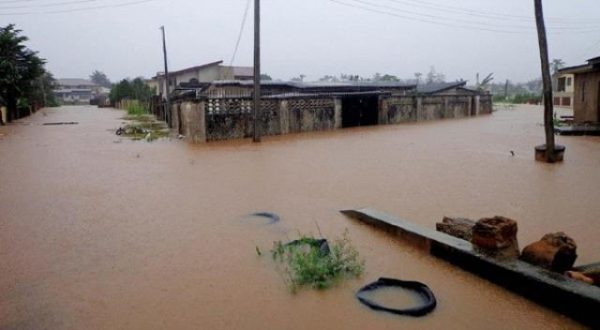By Emmanuel Ndukuba, Awka
Floods have devastated four local government areas in Anambra State, leaving numerous families homeless.
Residents, who had believed flooding would not occur this year, were surprised when it finally struck.
The early dry season has proven them wrong; last week, farmers in these areas woke up to find their homes and farmland submerged.
To avoid being caught unprepared, farmers in Mmiata Anam, Ukwala, and other communities in Anambra East and West have begun harvesting their crops early.
Prince Chris Okwuosa from Umuzu in the Ogbaru local government area expressed his concern: “We thought that the flood would not come this year because the usual period for flooding has passed. By now, the flood should have receded, but it is coming late.”
“We have started removing our belongings, and each day we witness the floodwaters increasing, contrary to what we’ve seen in the past. Other communities like Amiyi and Ogbakuba are becoming submerged.”
Sir Michael Chukwusa, the President General of Akili Ogidi Community in Ogbaru, noted that this year’s flooding is arriving too late.
“About eight towns have already been submerged. From Atani to Ochuche, Ogwuiklele, Ogwuaniocha, and my town, Akili Ogidi, have all been affected by the flooding, forcing people to relocate to higher ground,” he said.
Reacting to the incident, Anambra’s Commissioner for Environment, Engr. Felix Odumegwu, said the government is acting swiftly.
He attributed the late flooding this year to climate change, explaining that flooding occurs due to intense, prolonged rainfall.
”Climate change is a significant contributor to this late flooding. Globally, cities like Valencia in Spain, Italy, Dubai, Saudi Arabia, and various parts of the USA have experienced severe weather that has led to flash flooding.”
“The state government, led by Prof. Charles Chukwuma Soludo, has been proactive.
“A flood management committee has been activated, led by the Deputy Governor, Dr. Onyekachi IIbezim, with members including commissioners for health, environment, education, information, power, local government, and the State Emergency Management Agency (SEMA), as well as local government chairmen.
“This team has been meeting regularly to prepare for flood mitigation. The government has activated local government emergency committees in the eight LGAs that typically experience flooding.
“Additionally, the government has established and prepared 27 internally displaced persons (IDP) camps to accommodate those displaced, in collaboration with the National Emergency Management Agency (NEMA) and the International Organization for Migration (IOM). We are currently collecting relevant data on the flooding situation,” Odumegwu noted.
He also mentioned that, with support from UNDP, the Anambra state government has developed a comprehensive flood resilience plan.
“As early as March this year, we began preparations to reduce flooding, including the desilting of drainages across the state.”
“Food and other essential materials are being provided for the welfare of the displaced persons.
“The Bank of Industry donated 2,400 food combo cartons comprising indomie, salt, sugar, semolina, flour, and vegetable oil. The Church of Jesus Christ of Latter-day Saints also contributed items such as rice, beans, indomie, and other supplies,” he added.






















Leave a comment